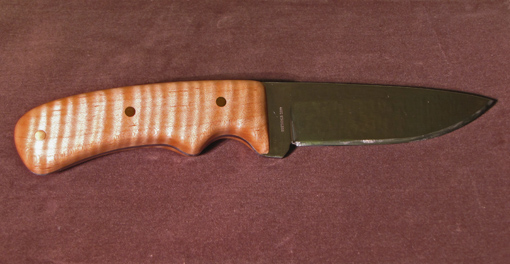
I was browsing in a Woodcraft store a while ago and saw some blank knife blades to which only a wooden handle needed to be attached to produce a nice knife. I am not a knife maker but I certainly like tools, including knives, and figured this would be an easy diversion for me, an experienced woodworker, while more profound projects ruminated in my head. Ha! Yeah, right.
I bought two. I was thinking vaguely, without fully admitting to myself, that one was to screw up and learn on, while the second had a shot at turning out OK. Really, it was not a difficult project, but even such a seemingly straightforward job as this harbored glitches that, lacking specific experience, I was unlikely to anticipate.
How was I to know that the quick-set epoxy would make an ugly thick glue line, or that blending the handle near the heel of the blade would be tricky? Even though I’ve handled knives for many years, decisions for the figure, weight, thickness, and contours of the handle were confusing. I also was not accustomed to seeing sparks fly off the drum sander along with the usual wood dust.
In short, after irretrievably messing up my first attempt, the next try resulted in a decent handle. The process still felt awkward, and I know there is plenty of room for improvement.
So, while not wholly unfamiliar, this was new territory for me. The experience reminded me how damn difficult it is to make things, especially to make them come out the way you really want them to come out. It’s not quick, easy, or perfect every time.
To students of woodworking, and that means all of us, I suggest we ignore the popular trend of hawking this or that technique as easy-peasy, quick as a flash, or (ugh) “perfect every time.” Woodworking is none of those. Sure, you and I can and will learn new skills and do excellent work, but it’s really not easy.
So, ignore the hype and keep making sawdust. Happy woodworking!


As in housebuilding, you have to build your house once and live in it before you can build your house. I know.
To a person returning to woodworking and finding himself making silly mistakes one after the other and not achieving perfection every time (or any time), this is a refreshing admission to read. Thanks for letting us hobbyists bash ourselves a bit less for hitting less than perfect each time.
Kudos for being so forthright about this project. I looked at those knife blanks with the the exact same thought — super easy way to make a knife for a cutting board. It’s easy to forget that the things we do well, are the things for which we were willing to endure a tedious learning curve. It reminds me of playing music — mastering the chord changes is about 5% of the work, the other 95% is making mistakes!
A long time ago, I built model kits. I remember one guy built a large – like 1/18th scale – Tiger tank that was fully accurate and super detailed in and out beyond belief to other modellers. Someone asked him how he made all those details so perfect. He said “Well, I have another one at home that’s not quite as nice.” Always stayed with me.
I’m trying to teach myself double bevel marquetry these days. There’s been lots and lots of making the same portions of larger images several times – each time with a little more success. That’s wood work – that’s life. Sometimes a teacher can short circuit the process a bit, but really, there is no substitute for experience.